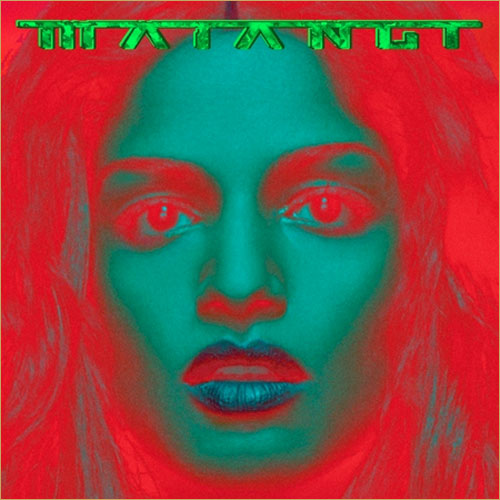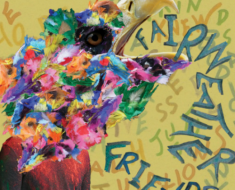Everyone’s favorite controversial rapping hottie, M.I.A., is back and better than ever with her new album, “Matangi,” via Interscope Records. The album is named after the Hindu Goddess of arts and knowledge, Matangi, and it certainly shows…this record is brilliant. “Matangi” is ripe with classic hip-hop beats mashed up with middle eastern accents, and will leave listeners guessing what’s next until the very last second. One of the first stand-out tracks is the hypnotically danceable “Only 1 U,” who’s bass-heavy undertones will make you bang your head until it hurts. M.I.A. enraptures with the first single off the album, “Bad Girls,” (prepare to feel like a total badass) before keeping the party going with the second single, “Y.A.L.A.” (You always live again). Make sure to also take a listen to “Double Bubble Trouble,” a track that combined countless genres, tempos, and influences to make one fantastic banger. You’ll hear influences from Sublime, Run DMC, Bob Marley, and more. Lastly, I feel the need to mention “Boom Skit.” Although it only clocks in at a little over a minute, M.I.A. calls out all her haters – from people saying she stole Madonna’s thunder at Halftime, to conservatives calling her a terrorist, to the musical elite claiming that she’s not “legit,” M.I.A. has had enough, and it’s amazing. Overall, “Matangi” is a serious contender for album of the year, and music fans old and new should give it a spin. You can check out the full story behind “Matangi” below, courtesy of M.I.A.’s official website. It’s a long read, but well worth it…
“Once there was a girl named Matangi. This was 5000 years ago. Her father was an untouchable fearsome fighter and was a sage who gained sublime power through ascetic practice over thousands of years, and Matangi became known as a goddess of music and spoken word; she wasn’t a warrior but rather a minister sometimes referred to as the Queen of Queens. She spoke truth to power by communicating from the heart, if we’re not speaking from the heart our words are false and lack meaning. Matangi is often depicted carrying a sword in her battle to protect promise of freedom that words possess and the intrinsic value of that ideas contain; she also carries a parrot, a bird smart enough to say something but not intelligent enough to know what it’s saying, a reminder to humankind of the inherent danger in all our babbling communications. Matangi is the only goddess who didn’t live in the clouds or in a palace, she made her temple as a shack in the ghetto where she walked in the street with outcasts and undesirables to deepen her understanding of what pollutes our society, not just detritus and effluvia but the harsh sonics, foul speech and hateful thoughts that poison us daily. Her mudra is two raised middle fingers with the hands locked in a sort of lovers embrace, her mantra is Aim, hers is the path of inner thought manifested in an artistic way but this energy can take any form, any of the 64 forms of artistry known as Kala.
Once there was a girl named Mathangi, let’s call her Maya. Maya grew up on Temple Road in a tough town called Jaffna, where she learned to sing and dodge the bullets of soldiers who sometimes shot out the windows of her school. She knew her father was a freedom fighter for people who could not fight, she never saw him, she was raised by her mother and the way things go grew up to be a rapper who made her home in cities, in London, in Los Angeles, in New York City.
From the very beginning her music was always an explosion of color, light, heat; she named her first album Arular after her father the fighter’s wartime sobriquet. It was her father from whom she learned basic concepts and values and so Arular surprised and delighted as an exposition of apprenticeship in all the flows and feelings bubbling up from the streets at the time.
She named her second album after her mother Kala who taught her early lessons in creativity. She made Kala everywhere she could and as a delirious confection of worldly pop perfection Kala went everywhere it could, from endlessly bootlegged CDs to blockbuster soundtracks to improbable remixes with monsters of rap and suddenly there she was onstage at the Grammys a few days before giving birth, all of it made wild sense when previously it had been impossible to imagine.
Her third album was Maya. Maya was about truth and lies, freedom of speech and the struggle of media in a time when the CIA battles Hezbollah via Twitter. We all tweet incessantly the way parrots in the jungle do; we never consider how far the smallest idea can travel and how it can affect the people it reaches. You would consider Mayato be an eponymous release were it not for the fact this was never her actual factual name. Maya is the manifestation of the physical world, the illusion of this dusty net in which we live, the most negative aspect you must overcome to reach nirvana. Some loved Maya and some hated Maya and that is the duality of Maya. You either love the material world and believe in material girls or you break it all down, move past it altogether, it was never a real place, it’s not where you end up, once you pass it you arrive at Matangi.”







